International accounting regulation: a model based on rules or principles?
DOI:
https://doi.org/10.21501/2500-669X.2473Keywords:
Regulation, international accounting, conceptual framework, principles, rules.Abstract
The process of globalization has been the fundamental cause by which the different processes at world level have had to evolve to adapt to an internationalization environment. Accounting, as a business language, has not escaped this reality, especially since in the 1970s an agency was created that is responsible for issuing international standards that regulate accounting activity around the world. The research presented is of a documentary nature, and aims primarily to react on the tensions between principles and rules in accounting; and then covers what concerns the conceptual framework and international standards. The fundamental conclusion is that the issuance of international standards to regulate accounting practice has resulted in the neglect of the descriptive methodology for the issuance of accounting principles, in favor of a normative methodology, which provides both principles and rules for the actors in the accounting process have orientations that guide them in their professional judgments.Downloads
References
Cañibano L., Tua J. y López J. (1985). Naturaleza y filosofía de los principios de contabilidad. Revista Española de Financiación y Contabilidad, XV (47), 293-355
Durán, M., Gil J., y Vílchez, P. (2010). Hacia la convergencia mundial del marco conceptual para la preparación de los estados financieros. Revista Contabilidad y Negocios, (9), 19-56.
Federación de Colegios de Contadores Públicos de Venezuela (1997). Declaración de Principios de Contabilidad N° 0. Comité de Principios de Contabilidad
Guajardo, G. (2005). Fundamentos de Contabilidad. Primera edición. México, D.F: McGraw-Hill Interamericana.
Hendriksen, E. (1974).Teoría de la Contabilidad. México: Unión Tipográfica Editorial Hispano – Americana
International Accounting Standard Board (2010). Marco Conceptual para la Información Financiera.
International Accounting Standard Board (2002). Prólogo a las NIIF
International Accounting Standards Board. Constitución de la Fundación IASC (2000). Aprobada por los Miembros del IASC el 24 de mayo de 2000, en la asamblea celebrada en Edimburgo, Escocia, y revisada por los Administradores de la Fundación IASC el 5 de marzo y el 8 de julio de 2002 y el 21 de junio de 2005.
International Accounting Standard Committe (1989). Marco Conceptual para la Preparación y Presentación de Estados Financieros.
Molina, H. y Tua, J. (2010). Reglas versus Principios contables, ¿son modelos incompatibles?. Revista Española de Financiación y Contabilidad, XXXIX, (146), 259-287
Rodríguez, C. y Bernad A. (2007). Algunas cuestiones relevantes en el proceso internacional de convergencia contable: IASB VS. FASB. Revista Estabilidad Financiera, (13), 9-32
Romero, J. (2006) Principios de contabilidad. Tercera edición. México, D.F.: McGraw Hill
Tua, J. (1985). Los principios contables: de la regulación profesional al ámbito internacional. Revista Española de Financiación y Contabilidad, XV (46), 25-56
Tua, J. (1998). Cómo decíamos ayer…algunas reflexiones en torno al Derecho Contable, diez años después. Revista Técnica Contable. Volumen extraordinario, 199-236
Tua, J. (2000). La Armonización Contable Internacional. Revista Interamericana, (8), 63-79.
Tua, J. (2002). El marco conceptual y la reforma contable. Revista Partida Doble. (136), 52-59
Downloads
Published
How to Cite
Issue
Section
License
PUBLICATIONS POLICY
• The author must send completed the declaration of transfer of economic rights and declaration of conflicts of interest, which will be provided by the management of the magazine. This document indicates the originality of the article, which is not published in another medium and that is not simultaneously postulated in another journal.
• The author will transfer all rights to the article to the journal Science Of Human Action.
• Once the evaluation of the article has begun, the authors agree not to withdraw it until the end of the process.
• The Science Of Human Action journal will submit the articles received for initial evaluation by the Editorial Committee, in case the Committee finds the material pertinent, it will be evaluated by two anonymous referees who will determine if it is publishable. If one referee approves and the other rejects it, a third party will be appointed.
• The address of Science Of Human Action will answer within a maximum of three (3) days about the receipt of the contribution received from the author.
• Printed items will not be received. All the proponents will have to send their writings through the e-mail of the magazine.
• Partial versions of the text will not be received, that is, those that are not structurally adjusted to the type of article.
• Once the article is sent, it is understood that the author authorizes the publication of these data.
• The reception of articles does not imply an obligation to publish them. The authors are directly responsible for the ideas, judgments and opinions expressed in the articles; in such a way that the content does not compromise the thinking of the Editorial Committee or the Institution.
• Once the article is submitted, it is understood that the author authorizes the publication of the data corresponding to the author's note.
• This is an open access journal that does not charge authors for either the editorial process or the publication. All costs of editorial production are assumed by the Luis Amigó Catholic University.
ETHICS OF PUBLICATION
• The Editorial Committee, by virtue of transparency in the processes, will ensure the academic quality of the journal.
• Causes of rejection are considered: plagiarism, adulteration, invention or falsification of content and author data, which are not original and unpublished.
• In no case, the journal's management will require the author to cite it or publish articles with conflicts of interest.
• If once the article is published: 1) the author discovers substantive errors that threaten the quality or scientificity, may request its removal or correction. 2) If a third party detects the error, it is the obligation of the author to retract immediately and proceed to the public removal or correction.


